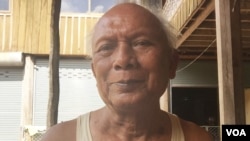Since the Khmer Rouge tribunal decided to drop all charges against former regime official Im Chaem in February, numerous ex-cadres have come forward to call on the court to dismiss charges they face in upcoming cases.
Ao An, 79, a former deputy commander of the Khmer Rouge’s Central Zone, told VOA Khmer that he was appealing to the tribunal to follow the precedent set in the decision not to prosecute Chaem on the grounds she was not a senior regime leader or one of those most responsible for its crimes.
An is a suspect in Case 004 along with Yim Thit, the former commander of the Northwest Zone, who along with Chaem were charged with crimes against humanity. “I was not a top leader. I am also a victim like the others,” An said.
Meas Muth, another aging former Khmer Rouge commander and a suspect in Case 003, said that he would leave the decision to the court. He showed VOA Khmer reporters a coffin and shrine he has had built in preparation for his death.
“What I’m most worried about is that the temple which I’m building has not been completed yet. If the temple is finished before I die I will feel relieved when I pass away,” he said.
Muth is the only suspect in Case 003 charged with crimes against humanity, charges he denies. The cases have faced opposition from the government of Prime Minister Hun Sen, who has on numerous occasions expressed objections to the pursuit of further prosecutions and warned of “civil war” if international prosecutors continue to try former member of the regime.
Many people in former Khmer Rouge strongholds in Cambodia’s northwest agree with the premier.
Preap Yoeum, 60, a former regime soldier, said further prosecutions would harm Cambodia’s future. “Mistakes happen. They could not control all of the country by themselves, as I understand it, as other foreign countries interfere in Cambodia,” he said.
Another former soldier, Men Chhim, 72, said court proceedings should be restricted to the senior leadership of the former regime.
“If they only try the leaders, it would not create many problems. But if they try more, it would spread from one generation to the next,” he said.
Sem Sarin, 51, said that while “killing was a crime” many of those responsible had already died and those who were still alive should be allowed to live out the rest of their lives in peace.
Long Panhavuth of the Cambodian Justice Initiative, said political negotiations would need to take place to resolve the dispute over whether to continue with prosecutions under the tribunal.
“I believe cases 003 and 004 will be a situation where we can compare it to grilling a large elephant and we don’t know whether it is cooked or not. This is what the victims at the tribunal worry about,” he said.
He added that if perpetrators were seen as escaping justice it would undermine trust in the court, but he could foresee power being passed to a national court, with the international branch of the court possibly assuming an advisory role, the court being divided into smaller, case-specific trial chambers, or a final submission being passed and the court closed.
For Chaem, 75, the court should drop all further cases against former members of the regime.
“If the court just believes any story without evidence, it is wrong,” she said.
The court is expected to conclude case 002 next year.













